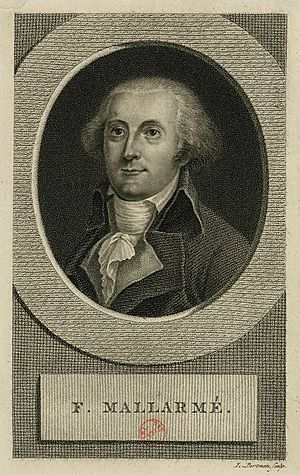François René Mallarmé facts for kids
Quick facts for kids
François René Mallarmé
|
|
|---|---|
 |
|
| 19th President of the National Convention | |
| In office 30 May 1793 – 13 June 1793 |
|
| Preceded by | Maximin Isnard |
| Succeeded by | Jean-Marie Collot d'Herbois |
| Personal details | |
| Born | 25 February 1755 Nancy, Kingdom of France |
| Died | 25 July 1835 (aged 80) Malines, Kingdom of the Netherlands |
François-René-Auguste Mallarmé (born February 25, 1755 – died July 25, 1835) was an important French politician during the French Revolution. He was also a strong supporter of Napoleon Bonaparte and the French Empire.
Mallarmé's journey in politics is interesting because he first strongly supported a very strict period called the Terror. However, he later turned against its leaders, including Maximilien de Robespierre, and supported the governments that came after. He was given special titles by Napoleon, becoming a chevalier de l'Empire in 1808 and a baron de l'Empire in 1810.
Contents
Early Life and Political Beginnings
François-René-Auguste Mallarmé was born in Nancy, in a region of France called Lorraine. His father was a lawyer, and François followed in his footsteps.
When the French Revolution began, he started his political career. In 1790, he was chosen to be a procureur-syndic for the Pont-à-Mousson district. This job was like a local government official who managed public affairs.
Mallarmé and the French Revolution
In 1791, Mallarmé was elected to the Legislative Assembly, which was a key government body in France at the time. A year later, in 1792, he was elected again to the National Convention. This was another important assembly that ruled France during the Revolution.
While in the Convention, he joined the finance committee. He was also briefly appointed to the Committee of Public Safety in 1793. This committee became very powerful during the Revolution.
Mallarmé was part of a political group called the Montagnards. He voted for the death penalty for King Louis XVI. From May 30 to June 13, 1793, he served as the President of the National Convention. During this time, he oversaw discussions about removing the Girondin faction, who were rivals of the Montagnards.
Role During the Reign of Terror
Mallarmé was sent on several special missions to different parts of France. These missions were meant to support the revolutionary government. For example, he helped with the levée en masse, which was a mass draft of citizens into the army.
During one mission in 1793-1794, he gained a reputation for harsh actions and arrests. He was known for being very strict in enforcing the revolutionary government's rules. Like other powerful figures of the time, he was involved in some of the extreme actions of the Reign of Terror.
However, as the Terror continued, Mallarmé's own position became risky. To protect himself, he spoke out against Maximilien de Robespierre during the Thermidorian Reaction in July 1794. This event led to Robespierre's downfall and ended the most extreme part of the Terror.
After the Terror: Thermidorian Reaction
After Robespierre was removed from power, the political situation in France changed. Mallarmé was sent on new missions, this time to different areas like Haute-Garonne and Gers.
His goals on these missions were very different. He now worked to close down the strict Jacobin clubs, which had been powerful during the Terror. He also helped to free prisoners who had been jailed as enemies of the state.
Despite his new actions, his past involvement in the Terror caught up with him. He was accused and arrested in June 1795. However, he was released later that year due to a general amnesty, which was like a pardon for political prisoners.
Later Career and Exile
In 1796, a new government called the Directory appointed Mallarmé to help organize new regions in France.
Under Napoleon Bonaparte's rule, known as the Empire, Mallarmé worked as a tax collector in Nancy. He collected droits réunis, which were like sales taxes. He lost his money in 1814 when he helped raise volunteers for the army.
During the Hundred Days (when Napoleon briefly returned to power), Mallarmé was appointed as a local official in Avesnes. After Napoleon's final defeat, Mallarmé was imprisoned by Prussian authorities for six months. This was seen as revenge for his actions during the Revolution.
After his release, he sought safety in Brussels and then Mechelen (Malines). He remained in exile during the Bourbon Restoration, a period when the old royal family returned to power in France. He died in Mechelen in 1835.
 | Ernest Everett Just |
 | Mary Jackson |
 | Emmett Chappelle |
 | Marie Maynard Daly |

